#utena anon come backkkkk to me :( my inbox and indeed my messages are extremely open
Explore tagged Tumblr posts
Text
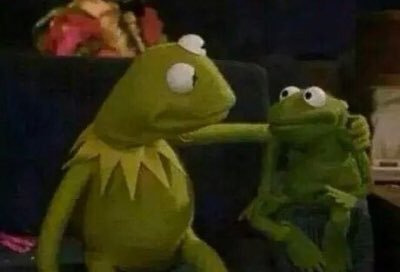
been doing a Slow and Considered utena rewatch... and, look. I am deeply deeply wary of any mode of watching fiction about women that ends up just. centring men. this is not praxis. so as a disclaimer... 95% of my utena thinking has had NOTHING to do with this, it's just that this has become the place I put my motogp thoughts. not my utena thoughts. ideologically I object to even making this post on several different levels. so. with that in mind, and the knowledge that at most a single digit number of people will see this. let's go
one of my fave things about anthy as a character is how much she acts as... a mirror of sorts, not an empty vessel exactly but someone who isn't quite treated as a person in their own rights... like she's obviously not REALLY an empty vessel, she has her own thoughts and ideas and feelings and backstory, but her entire purpose is to not impose her own character on events. so you've got basically every character projecting something of themselves onto her - utena's desire to be a prince, saionji's performance of masculinity, miki's rejection of (his sister's) maturity etc etc etc... and they all essentially see what they want to see, or what they need to see, right. with saoinji he gets the worst of it because he's so obviously extremely delusional about this whole rose bride gig, he serves the function of accidentally revealing comic relief. but they're all at it. which makes it so fun to actually work through the show and detect where anthy is exerting agency... and she is kind of torturing the student council members, right - she might be the victim but she's also the tormentor
and what slaps about this 'witch' role that she plays is that she... kind of ends up bringing the worst out of everyone she comes across. she's unpopular, she's the scapegoat to be blamed when saionji has his depressive episode upon losing her, she's constantly positioned as a seductress just by existing. she brings out the pettiness in people, their smallest fears, lowliest desires... her brother was the one going around saving the maidens in the world - she might have the power, but all she could do with it was spirit him away and focus all the rage and bitterness of the world onto herself. she is the receptor for those emotions, she brings them out and then gets them projected onto her. and a big theme in this relationship between anthy and the outside world is this horror of crowds, of the judgement of mobs - which first really comes out during the ball in episode three, where nanami abandons her... "everyone's face begins to look the same and I get scared" she says earlier that episode
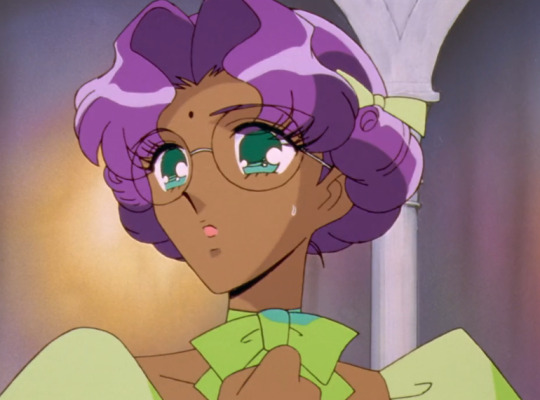
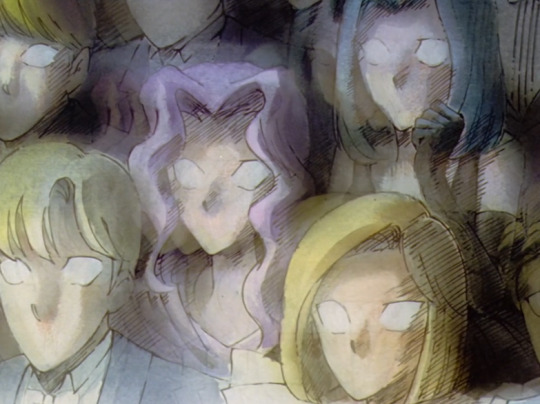
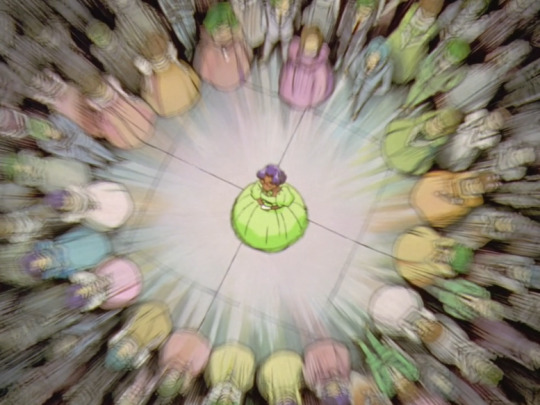
and then in episode 34 you get the 'explanation', the foundational myth of the show. anthy acting to protect her brother, who had taken upon himself the burden of saving the world - and in doing so takes the burden upon herself of the world's hatred. its fears and its cruelty. so you see the villagers come for her and enact their punishment... stabbed by each of them and hung up in eternal suffering
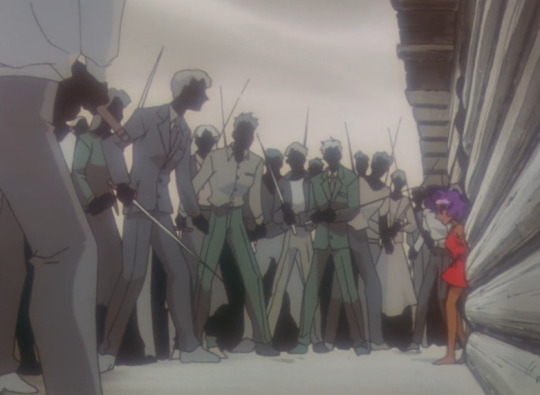
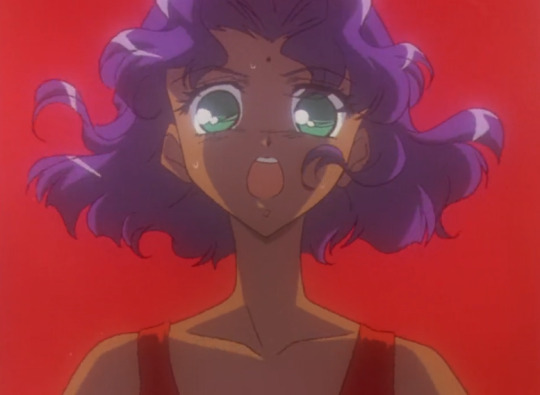
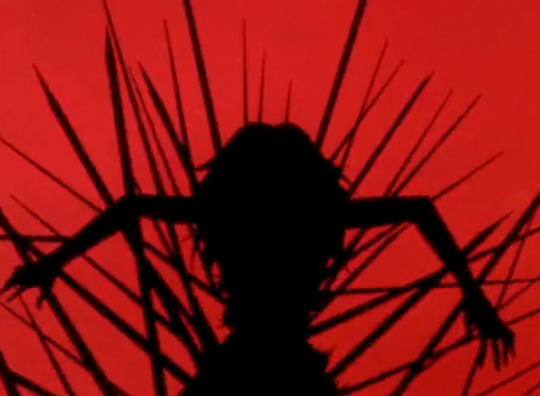
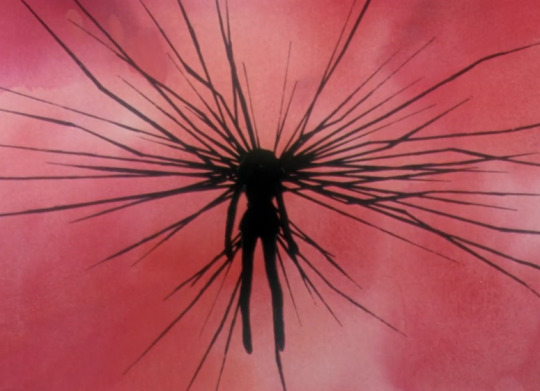
and that's the role she then takes in the series, right. she's the one who is leading mikage in corrupting students, whispering in his ear and pretending to be his loved one to further the cause. she provides miki with this ideal of submissive virginal femininity so he can fully condemn his whore sister. she teases out wakaba's envy of the special and the unique and the desirable by making herself appear the willing recipient of saionji's affections. she judges them even while she is judged - she serves a transformative function, she ends up revealing the worst in those who cross her path
and then you've got utena, who is the exact opposite - the extremely popular jock not yet disillusioned with societal ideals. her gender nonconformity isn't punished within the school environment (and her teacher's attempts to enforce the uniform code are never treated seriously, are merely scoffed at)... the girls love her for it and flock to her when she shows off her basketball prowess, swoon at her for merely walking past
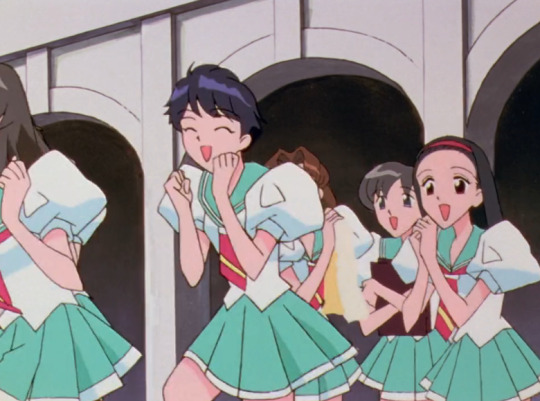
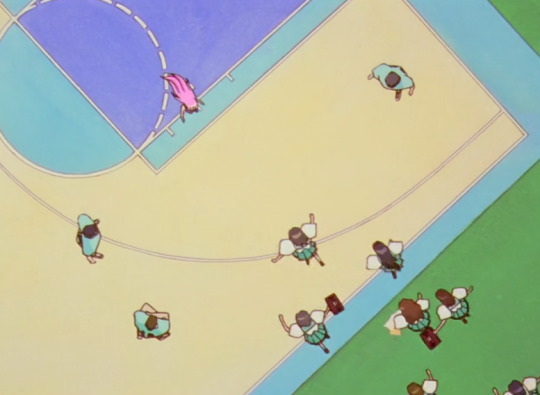
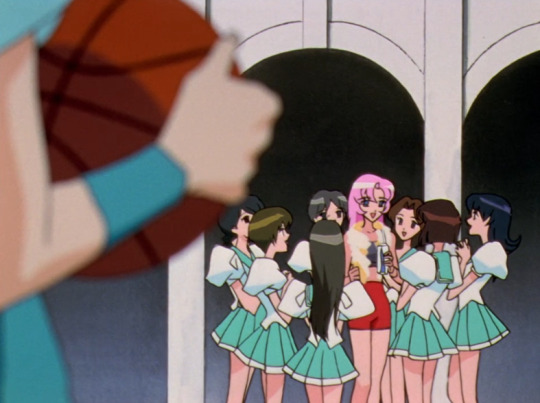
utena is a strident individualist, one who with her protagonist juice doesn't even need any student council exemptions to defy the dress code. she stands out, she is supposed to stand out - and she is rewarded for it, up to a point. whenever she suffers her greatest defeats, she is forcibly feminised... whether she does so to herself, or whether akio quite literally dresses her in the costume of a princess. when akio has sex with her, she seems to embrace this femininity as a kind of maturity - but it is a false coming-of-age. this is not a style of presentation she would choose for herself. she wishes to be the prince
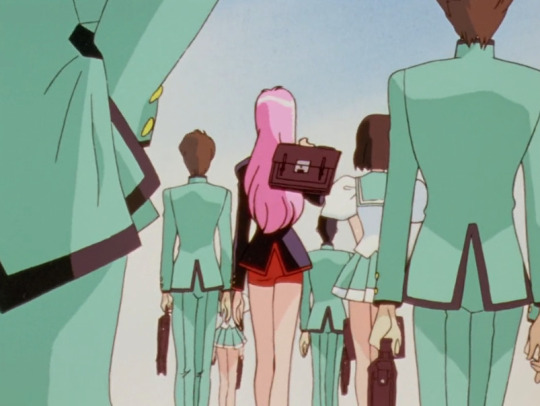
right then. none of this is particularly novel analysis - it's really just set up for where I'm going with this post. so that we're all on the same page. no particularly graceful way to manage this transition... but well. time to talk motogp. and I was thinking about some of this projection and perception business in relation to valentino. even if there is obviously something counterintuitive about relating anthy, whose entire character is about weaponised passivity, to valentino, who is anything but passive... but hear me out
valentino obviously has this stable enduring popularity going for him - one that resembles utena in being so unconditional he almost doesn't really have to care about it. public perception does matter especially when he can wield it as a weapon, but the public's love is never in question. utena can essentially opt out of a lot of the conventions and norms of the school because she doesn't even have to consider a world where she might be rejected. she is liberated by not having to fear the role of the social outcast. there is something about this with valentino too, who was horrendously popular before he even wanted to be and was prepared to deal with that level of attention paid to his every move. it's really key that this affinity starts when he's about 16-17... from then on, he is the public's starlet and then their god - and even when he has his scandals and controversies, that fundamental dynamic won't ever change. you see with a lot of his rivals how... there is this concern with image, right, this desire to be loved, or at the very least accepted by the masses. that simply isn't a concern for valentino, who often seeks to manipulate but far more rarely attempts to persuade. his popularity is a fact of his existence
Akio: Oh? Wakaba-san... Utena: Right. She's completely different now. Akio: Like the goddess who leaves her name to the stars in the heavens... is that how it is? Utena: But how did she become so pretty all of a sudden? Akio: You don't understand, do you? You, living out your predestined fate... Utena: Huh? Akio: There are special people in the world. And they are always noticed. For example, like yourself... Utena: Me? Akio: Attend me. You're not particularly self-conscious, correct? That is the special quality that you carry from birth. Utena: Oh? Akio: Most people are but a single person amongst multitudes. However, given the slightest chance, they will shine with a light that they have never had before. Utena: I've just wanted Wakaba to be happy for a long time. Akio: It could even be said, that for many people, their special time lasts but briefly.
"you're not particularly self-conscious, correct" - and of course, this rare narrative juice allows them to transgress the established norms of gender without being punished too severely. utena can claim her role of prince, valentino can allow himself his girlish locks. it is during this time period that the public falls in love with him, the flamboyant clown who makes a mockery of the machismo of motorcycle racing. remember what valentino's very first rival in gp racing said:
“I saw a young guy with dyed hair and earrings who was like Superman on the bike. I thought to myself: 'That’s not for me.’ At first it was a shock. In 1996 we had already clashed a few times. He touched me once, we had an argument. In 1997 Valentino Rossi made me retire. But that’s not a bad story for me.”
it's transgressive - but it's ultimately going more or less unpunished. utena has her flocks of female admirers, straight men can't seem to get enough of valentino. he does not need to be self-conscious. he can be affected by controversy like anyone else, but rarely is he actively attempting to win popularity. he was loved enough early enough that it has become nothing less than a fact of his existence
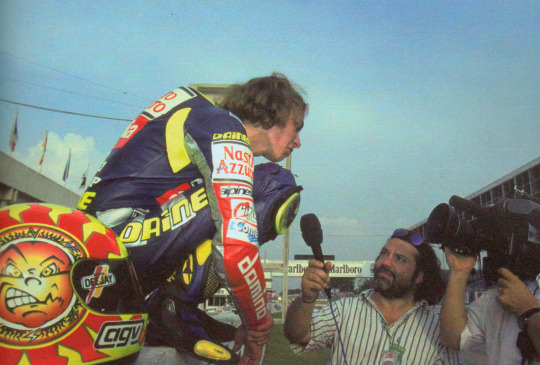
which obviously brings its own perils with it. I've posted two extended discussions in valentino's autobiography of his relation to fame - and in fact they follow directly on from each other, first here then here. in one he frames his preference for the night in terms of the anonymity it provides, these precious moments where he can disappear. the night allows him to be unseen, to escape the crowd at last. his fame is such that he cannot live an ordinary life - and the italians never fail to recognise him
As I say, I have a special relationship with the night. I like moving in it, living in it, thinking in it, relaxing in it. The night fascinates me, because it’s the period of least confusion. The world calms down, it goes quiet. And, besides, I’m Valentino Rossi. I’m wanted… I’m a fugitive.
the second excerpt goes into more detail about his relationship with the italians - for all his love for them, how he struggles with the familiarity they assume. the extent to which they treat him as theirs... he talks of 'types' of italians, who all want different things from him - but what they want says more about them than it does about him. he might as well be a mirror. he is not expected to contribute to those discussions, merely to be a prop within them. the worrier, the sensationalist, the moralist... they all bring so much of themselves to this encounter and little of valentino - the idea of valentino is enough to make them content. which gets at the very function of sports, right. this arena of heightened emotion that you can project all your everyday worries and fears onto, a form of escape and also of release. artificial competition, in truth meaningless but the feelings are still plenty real. the very process of being a fan of someone involves a form of projection. you see what you want to see, you respond to the traits you want to respond to - and in the end, you form a one-sided bond that you get something out of emotionally speaking. the public persona and the athlete and the competitor and the character and the person... there is some overlap here, but it is far from absolute. if anything, the person is the least relevant. who cares about the contents of their hearts? this is not about loving an individual, but instead loving what the individual/team represents to you
and in that spirit, let's return to how I framed anthy's narrative role above. this object of projection, yes - but also this plot device to tease out hidden truths within the other characters, to allow them to reveal the worst of themselves. anthy draws out all this resentment and rage and then concentrates it upon herself. now obviously, valentino functions a little differently - he is not getting the masses to hate him. quite the opposite... the shared thread is in drawing out extreme emotions, in how he can become an idea in people's minds more than a person. which is where we get to the most pertinent other 'characters' in valentino's tale - his rivals, who themselves are on their own narrative arcs within the sport. who bring an awful lot of themselves into this rivalry, to an extent that sometimes feels like it's being missed when valentino's feuds are being discussed. what makes valentino so narratively useful is his malleability, how many different versions of him have existed across his career... the fact that he likes to vary his appearance fairly drastically provides a bit of a convenient navigational guide. a way of expressing himself that varies over the years and points to his self-perception as well as the role he will now fulfil. different rivals will have come across entirely different versions, each suited to whichever particular moment of valentino's career he found himself at... in some ways, what's most fun about valentino is that... as much as he is a person, in the context of the sport he is also a plot device, this surefire way of generating narrative tension that is really pretty unique. he's basically a way of putting guys into Situations, right. it's such a great idea for a sport to just have someone around to consistently put guys into Situations
and what that involves is rivals who are also pouring quite a lot of themselves into these rivalries... oftentimes they see in valentino what they want to see, or what they need to see, in a way that is only tangentially connected to 'reality'. here, it is jorge who is kind enough to provide us the parodic extreme, with his biography littered with film references and comparisons to other sports that all provide the road map for understanding his view of the world in the late noughties - less in the specifics of any particular inspiration he cites, but more in what it tells us about how he is processing events. valentino very obviously has a designated role here, this established legend of the sport who jorge can learn from and measure himself against and eventually conquer. the emphasis is very much on honourable combat and mutual respect - albeit with jorge's flair for the dramatic, this prior understanding that rivalries are supposed to get a bit ugly. jorge during the first half of that particular rivalry is on his own little coming-of-age arc that has markedly little to do with valentino the person. jorge talks of wanting to make himself a 'character' like that of valentino's, he desires the love of the public... his disillusionment comes when he realises that his end goal might not be particularly achievable. championships, yes - but the kind of affection valentino inspires? not a chance
instead of adoration, he is faced with widespread contempt and hatred, often at the hands of valentino's fans. it is a realisation the creeps up on him just as he wins his first championship... given the timing of motegi, you could say he is being forced to come to grips with this at the precise moment when he seals the title. valentino hardly shies away from adding fuel to the fire in that 2010 season, unimpressed by jorge's ill-advised gesture with the shirt at mugello - so painfully jorge in a way that was never going to work out for him - and later provoking him at motegi in the heat of battle. this is not valentino attempting to win over the masses. he knows their support is baked-in. often, he does not have to do his own dirty work where mind games and such are concerned... the media can generally be trusted to harm his opponents more than they do him, without much intervention on his part. valentino is far from a passive agent in this feud, but he can allow himself to be more restrained than sometimes appears. their rivalry in 2008-10 does much to change jorge, but valentino is left entirely unaffected
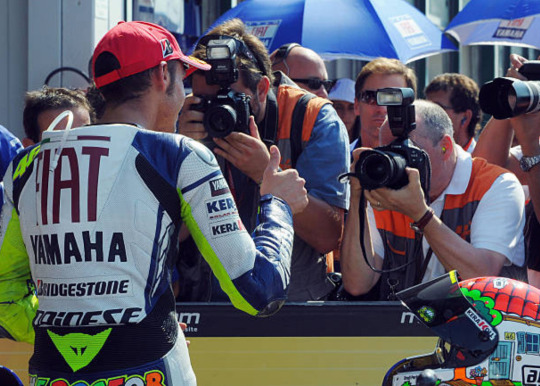
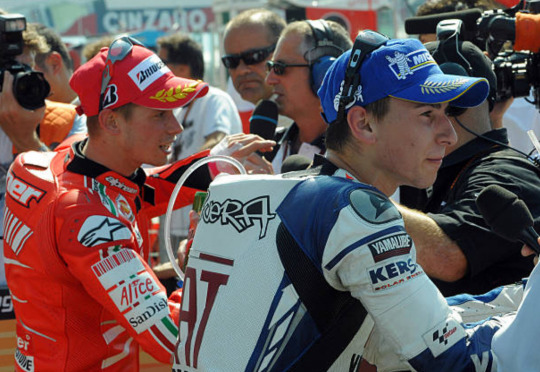
sullen biaggi courting a woman called valentina in a sequence that would make freud wince - unable to find joy while valentino tortured him. image-conscious sete priding himself on the respectful rivalry right until the moment where valentino laid bare the ugliness beneath. tormented casey, finding in valentino echoes of all his neuroses and more besides. brash jorge, who had already assigned valentino a role from the start, before finding that valentino might be possible to beat but impossible to imitate. and the brave marc, so keen to take his place at his idol's side in the pantheon he forgot to consider what fighting him for real might look like. valentino represents something completely different to each of them... it is remarkable in its own right that all three of sete, casey, and marc were so completely blindsided by any enmity developing in the rivalry. sete, who thought himself different from biaggi, casey, who thought himself different from biaggi and sete - marc, who thought himself different from all of them. sete befriended valentino, whereas all three of casey, jorge and marc idolised him at one point or another. each was eventually surprised by valentino in some way... for each of them, valentino was the single most influential rival in changing them as people. in their character arc, if you will
obviously, when you talk about projection, you do have to pay special attention to casey. who was really working overtime on the projection front. the casey/valentino rivalry isn't quite as interpersonally convoluted as valentino's rivalries with sete and marc, doesn't quite have the comedic flair of the jorge feud - but I'd wager that in terms of thematic richness, it comes out on top. a lot of the heavy lifting is done here on the casey side of the equation, given that valentino is more or less a static character in this rivalry. he is more casey's foil than vice versa. he is a plot device to provide us a thorough vivisection of casey's character. how much you enjoy this rivalry will ultimately depend on how interested you are in casey as a person, which *stares into the middle distance* does feel like a pretty niche area. obviously, this thematic richness makes it extremely utena-able, as has been previously discussed in this parish. it is the rivalry that has by far the best colour-coding, which - shush, this matters to me. and crucially casey has been so kind as to ensure that it matters... by giving us the key insight into his psyche that 'things being too yellow' is a thought that has existed in his brain. casey is hot-headed, defiant, wildly talented - valentino is calculating, cunning, and relies on those traits more than any other to get the edge over casey. talent vs ambition, if you will
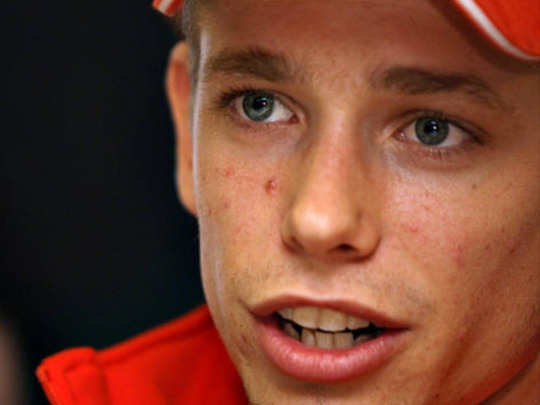
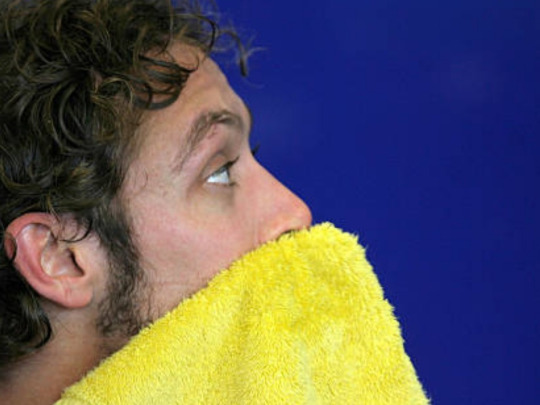
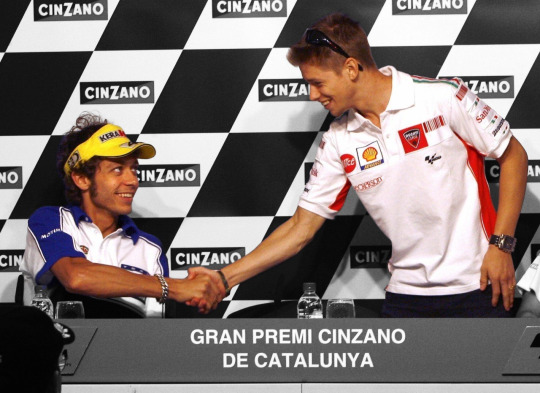
what makes casey so utena-able, right, is that a lot of his sturm and drang essentially relates to the job description of being a rider. it's his role that he's chafing at, the elements relating to politics and public performance and all the rest of it. he has to make his peace with this role to some extent - and then he walks away entirely (achieves revolution, if you will). though entirely is maybe overstating things... after all, he hasn't completely shut himself off from this world. he still gives interviews, he has opinions, he sells his side of the story. he's not suddenly un-learnt the lessons from his time in the sport. there's a certain level of media consciousness, an ability to play the game, that clearly distinguishes him from his teenage self. he's grown up. casey's story is always in conversation with that role of entertainer, where he rejects it and struggles with it and begrudgingly accepts it. and while casey might not yearn to be loved, exactly, he does want to be appreciated. he wants to be praised. he wants to be understood
"we [jorge and I] both can be misinterpreted because of how we appear" // "and I hope to go to dinner with him [valentino], to tell each other, from our point of view, what our challenges have been"
if valentino is the witch, then casey can play the role of one of the aspiring princes - and the amount he manages to project onto valentino could fill a small library. neuroses about being excluded from the club, about being the perpetual outsider, about the system favouring others, about his isolation, about how he cannot treat racing as anything other than serious business, about his feelings of cultural alienation at least partly stemming from his isolation crystalising in a very particular view of the european soul, about not being given enough credit for his talents, about people unfairly judging him, about undeserving success, about being judged as an entertainer not just a rider, about having to sell his story to the press, about being seen as mentally weak, about the idea that he might be broken, about having his physical issues not taken seriously enough, about not being treated with respect, about others bullying him on-track, about others riding dangerously, about being publicly embarrassed... look, I think you get the point - all of these can somehow be found lurking in the rivalry with valentino
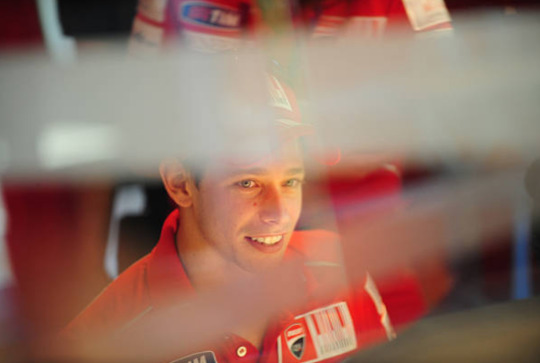
the thing about this rivalry is that you sat someone down in 2006 with a detailed psychological profile of casey but zero knowledge of motogp and came up with the brief 'come up with a guy to torture casey', honestly I don't think you could come up with a better concept than valentino. he just nails it on basically every front. as has also been discussed in plenty of detail in this parish, another particularly pernicious element is valentino's interpersonal charm - which works perfectly well to bewitch undersocialised brats in its own right. valentino is this larger-than-life figure within the sport and casey is unfortunately also very taken with him as a person. which, okay, maybe the lesson is to tell valentino to stop being so nice to twenty-year-olds - but broadly how their relationship develops in 2007 is primarily down to casey being a bit of an emotional mess. valentino is basically on neutral mode in how he approaches that rivalry, keeps a little distance as the battle lines are drawn but fundamentally is quite reserved and relaxed about the whole thing. given that he never gets quite as cold towards casey as he has done towards all his other major rivals at one point or another, this leaves casey in a position where he increasingly has to reckon between a perceived mismatch between valentino the person and valentino the character. the way he has dealt with this discrepancy is a combination of a) by verbalising it and implying he never really knew valentino 'as a guy', and b) by retconning how valentino actually behaved towards him over the course of their rivalry. it is quite convenient for casey to say valentino made an enemy of him the moment they became title rivals, that he flipped a switch and decided he wanted to destroy casey. it is also quite probably not true
casey's problem is that he tends to be someone who communicates his grievances in a fairly direct and straightforward fashion; he's not shy about voicing very specific complaints about everything from the media to the circuit officials to his team to other riders to the track to the constellation of clouds. as a result, it's actually pretty noticeable when he does not do this. laguna 2008 is one example where he is perfectly entitled to his general complaint about valentino's conduct - he is, after all, correct in his belief that valentino was willing to do whatever it took to stop casey from winning that race, including crashing them both out - but you do have to wonder why he is so coy about pointing to specific problems with valentino's riding. he flirts with accusations of brake checking, he says the corkscrew overtake was a problem but just one of them (perhaps not even the main one), he says the cameras weren't showing valentino's most questionable moves. which you'd have to say is highly unlikely. and we do actually know what casey does when he has what he believes to be a valid and defensible grievance where valentino is concerned - look at jerez 2011 and how he has beat that particular horse so often its bones are now thoroughly reduced to dust. this was caught on cameras and casey is in no way shy of referring back to specific details, most infamously the helmet valentino was wearing. we also know that casey is perfectly willing to engage with specific media utterances where valentino is concerned. exhibit A is how he never forgave valentino's crew chief jb for making it sound like the ducati could be fixed with some set-up changes - a wound that runs deep enough it made it to casey's autobiography. exhibit B is... well, any number of petty incidents over the course of 2011-12, including a particularly stupid one where an italian magazine reused some old valentino interview from somewhere to make it sound like valentino had attacked casey in late 2012, which casey then got snarky about on twitter (not the high point of that rivalry on any level)
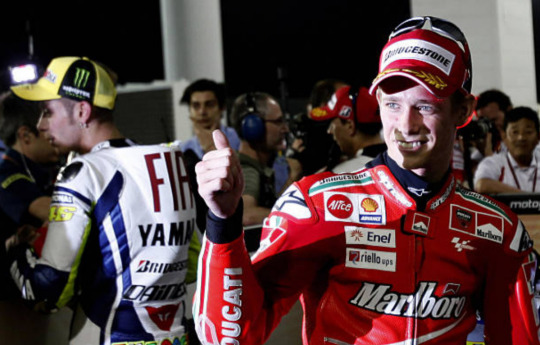
given all that, you do start to wonder when exactly valentino supposedly became such a sore loser during 2007. now, what casey most likely actually means is that he did not appreciate valentino's comments about his struggles with the michelin tyres, and how that was used by certain parts of the media and a lot of fans to suggest that casey's wins were any less worthy. which of course is unfair and unpleasant for casey to have to deal with... but once you notice the vagueness, you do start to wonder why he is so restrained in issuing any more specific complaints. in an odd way, casey can actually bank on valentino's own reputation here - even by this point, valentino obviously had a bit of a reputation for being quite ruthless with his rivals. which means that you've got this situation where journalists are reporting on what casey is saying about valentino, without actually including any specific examples of what he could be referring to. let's be blunt here - I have found a lot of quotes of valentino in that 2007 to early 2008 stretch give full credit to casey for riding very well, and no evidence of anything that should have attracted this level of remonstrance from casey. that doesn't mean valentino hasn't said anything... it is obviously way harder to be definitive about this kind of thing the further back in time you go and there probably will be something he said at some point to some italian reporter that somehow made its way back to casey. but also... so what. if valentino said something mildly snarky about the guy who was schooling him to that year's title, then, y'know. whatever. who cares
now obviously casey does care - and he has this fun combination of being reasonably impervious to valentino's mind games on a competitive level (for the most part) while also being extremely ticked off at them. I'm not sure I'm quite convinced by the 'valentino deliberately got the donington crowd to boo casey' story - it rates about at the same level as the 'casey said jorge was faking his injuries' tale as an anecdote by a single reporter with some broadly supportive circumstantial evidence but nothing particularly definitive. (also, in this particular instance, obviously only valentino will truly have known what he was doing - unless he was yelling 'boo casey' at the brits, at best this is all conjecture.) it does feel reasonable to believe valentino did like to weaponise his popularity, make a show of the cheering crowds in a way that was also a touch targeted... the shirt comment at motegi 2007 I could easily easily imagine as something casey was quite sensitive to (perhaps also the reason why he has never brought it up since) - an actual heartfelt gesture that valentino turned into a bit of a joke. failing to shake casey's hand on-track when he sealed the title is... tough to take seriously (perhaps the reason that too has not been mentioned since), likewise the story that casey didn't take kindly to valentino rocking up to casey's home circuit with special livery and leathers. this is... I mean, it's fine, isn't it. usually valentino's tales manage to be way more bonkers than what I'm used to with tennis, but on occasion this is the kind of thing where I wonder if I'm too desensitised. everyone plays some mind games, right
the other more unknowable variable is how their interpersonal relationship developed, whether valentino really had been way warmer with casey before casey was regularly beating him. again, the evidence I can provide with my own eyes sees basically zero difference between early and late 2007 - certainly not in term of tone of parc fermé congratulations, which casey so diligently provided us as a yardstick in his autobiography. yes, the head rubbing rate goes down, but again. this is also broadly to be expected between title rivals. at this stage at least, there really is nothing untoward happening. if valentino is talking less to casey because they are now direct rivals, then... fine. sure. fair enough, really. whatever casey might think, this is perfectly normal behaviour. valentino obviously ends up dramatically escalating the rivalry on the track - and however you feel about valentino's conduct in that race, this is a straightforward case of someone responding to real competitive pressure in a way that ended up working out well for them. just like valentino's choice to switch to casey's tyres - you'd have to say that in pure competitive terms, there really is nothing to fault about valentino's decision-making in this particular instance. you can actually make a pretty compelling case that valentino is never as close to being a rational actor as he is in this rivalry. how he conducts himself in that rivalry, how he handles the interpersonal elements, how he thinks his way through the on-track puzzle... you can clearly trace the logic in each step. it's ruthless, yes, but entirely cold-blooded
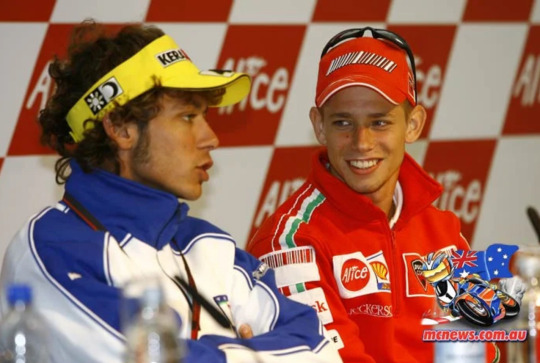
so. let's circle back to how valentino is the very worst rival anyone could possibly have cooked up for casey specifically. a lot of that is how a lot of casey's neuroses interact with valentino, how valentino manages to tap into quite deep, half-suppressed feelings of anger, fear, loneliness... it's in how valentino challenges casey both on and off the track, how valentino forces casey to learn some of his tricks if casey wants to be able to compete. and some of it is about how valentino isn't quite as easy for casey to just hate in peace. casey's problem is that in a very theoretical sense, he does like valentino. in another world, he would want to be valentino's friend. casey speedruns his disillusionment because he's a sensitive young guy who needs somebody to tell him that he's doing a good job now and again. unfortunately that person was just never going to be valentino
failing friendship, what casey does instead is project about a million of his issues onto valentino. and what's interesting about this is that it is possible for him to do so. that valentino is malleable enough a character - slippery enough, if you will, that casey can see whatever he needs to see in valentino. that he can piece this together in his mind. in rgu, anthy as a character functions by being so passive that she draws the other characters into projecting their own issues, desires, angst onto anthy... the only certainty is that she will have some kind of an effect on every character. obviously, valentino is far from passive - but you could say that his default charm somehow manages to play out in quite a similar way. he's larger-than-life, his reputation precedes him, he's so many things to so many people. he can be anything to them, if they so choose. if anything, you actually kind of need valentino's charm in this particular setting, considering he's constantly surrounded by repressed loners who need someone to draw them out of their shells a bit. once valentino has worked his charm, all bets are off. it is the extent to which valentino is synonymous with motogp itself that allows casey to see all his myriad issues with the sport reflected back at him. casey believes that valentino is always looking to make an enemy out of his rival - but, ironically, this has never been less true for valentino than it is in his dealings with casey. lonely, tormented casey... he is the only one who could make a rivalry feel like a personal exorcism
here's something to consider: for all that valentino engages with the public far more readily than casey does, there is an argument to be made that casey cares significantly more about what people think of him than valentino does. as said up front, valentino has been so secure in people's adoration for him for so long that it has morphed into a simple fact of life... for better or for worse. incidentally, this is something people get wrong about how valentino approaches the marc rivalry - it does not matter to him if there is controversy, if people hate him for what he said, if marc fans all renounce him... even if common sentiment swings against him. he isn't attempting to persuade. he is fingering a wound and pressing against it for the sake of the pain itself. the love of the people is something he can be assured of until the day he dies - if he is controversial, then so be it. what valentino has always insisted on is the ability to define himself, and he will not accept letting anyone think he feels any differently about marc than he does. generally, he has been far more willing to let others tell the story of the rivalry for him past the conclusion of the rivalry. in sete's case, he mostly opts not to talk about it at all. he has guided the narrative as far as he needed to take it, but no further. this is not a game of persuasion... when casey engages with the public, he is determined to make them understand him better. to the extent that valentino attempted to get the masses to do his bidding, he did so either for the fun of it or as another tool at his disposal. it mattes less what people really think, as long as they can put pressure on his enemies. the crowd is a mob is a weapon
obviously in this particular dynamic, it is casey who gets the unfair brunt of the public's hatred - valentino, for all his transgression, is loved unconditionally. casey is too surly, too whiny, too flat, too withdrawn, too self-critical, too stubborn... he loses the masses before he even understands that he needed to win them. jorge was a long-term student of valentino who had put excessive amounts of thought into how one would go about replicating that sort of character - casey, by contrast, felt that surely when he proved himself in the sport, popularity would follow automatically. for all the joy of 2007, for all that he repeatedly emphasises in his autobiography how happy he was... it probably tells you something that a reasonably sympathetic interviewer described him in early 2008 as an "angry young man" whose mentality was informed by "bitterness and rejection". what happened was this - casey had spent years and years fighting and struggling his way to the top, had been put under unfair amounts of pressure, had suffered and doubted himself and suffered some more... with the expectation that, once he reached the pinnacle, he would have won. finally he would definitively prove how good he was, finally everyone would give him the credit he was owed. casey might not desire the adoration of the masses, exactly - too self-conscious, still the kid who hid in his helmet because he was embarrassed at the idea of anyone cheering him on. but he did want a little of that... certainly to be seen, to be understood. to be respected for what he was and what he could do
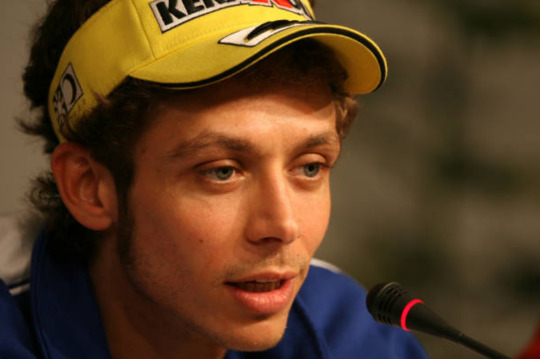
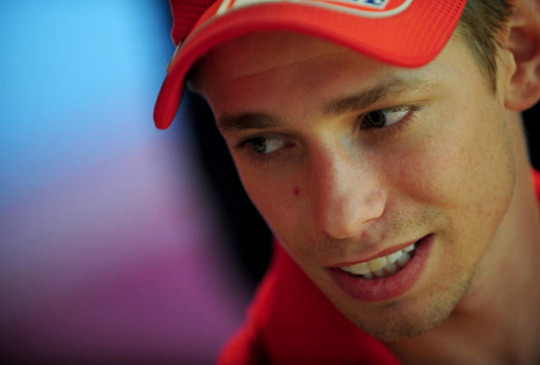
in the end, however much he enjoyed his title, the experience of 2007 will have felt like a disappointment. all of casey's prior angst did not suddenly dissipate because of his dominant season. he accomplished everything he always dreamed of accomplishing, and it did not suddenly erase what he had gone through to get there. worse still - the distaste of the viewing public, having just been treated to a close title fight between two of the most popular riders in an all-time great season for racing, in response to the 2007 season was palpable. casey wasn't supposed to be the challenger. he had shown them all for sure, but few pretended like they were particularly happy about that. the establishment, if you will, was not thrilled - valentino wasn't winning, the top american wasn't winning, the top spaniard wasn't winning. the racing was boring. none of this was casey's fault, but he was inevitably going to be the lightning rod for many of these criticisms. and it rankled. "it's been frustrating because everyone said my results were down to other things." "whatever we do we don't get credit." when he talks about feeling bad about getting the prize for young australian of the year over something as unimportant as motorcycle racing, and the interviewer prompts him that he has gotten some credit - "yeah, but so many people in press and paddock just want to put us down"
perhaps this sort of thing is part of what made casey so good, but on a human level you do feel like it would have been better for him to care a little less what the naysayers were saying. there were plenty of people who acknowledged just how good he was - not as many as there should have been, yes, but it was hardly a blanket dismissal. and he wasn't doing his cause any good with this kind of continuous talk - which is unfair, yes, but unfortunately this is a part of the game. not just of motogp, not just of european sports, but of sports full stop... professional sports is nothing without an audience and you cannot stop that audience from emotionally reacting to you. to reiterate, that's the whole point of sports. emotion in excess, released. that does not mean all is fair, that casey's criticisms aren't justified - but on a fundamental level, casey was always going to be disappointed. and, yes. valentino might be a bastard, might deserve plenty of the shit casey slung his way... but he was always going to disappoint casey. it was unavoidable. motogp never gave casey a fair shot. and yet, at the same time, casey's disillusionment was inevitable
rgu is of course a coming-of-age story that is heavily concerned with themes of innocence, of maturity - break the world's shell to achieve revolution. casey and his disillusionment are right at home here... the child who sought eternity, only for eternity to feel less sweet than it was promised. always looking behind him, longing after a half-remembered childhood innocence in a half-remembered land that he never truly got to live at all. an angry young man who never even had a childhood. youth forced prematurely into maturity, who wears it like an ill-fitting glove - jaded and naive at once, a cynic who is still at heart a kid. a revolutionary who barely comprehends what he is revolting against. casey might not fully understand the world he has entered, but he immediately grasps that it is unjust; he mistrusts all systems he comes across, without having any framework to make sense of what he is objecting to. at least his grudge against valentino provides him something to orientate himself. the lessons he begrudgingly learns from valentino in the following years guide him as he goes forward. he has not found the joy and the relief at the pinnacle he was hoping for - but for now, anger and hatred will do just nicely
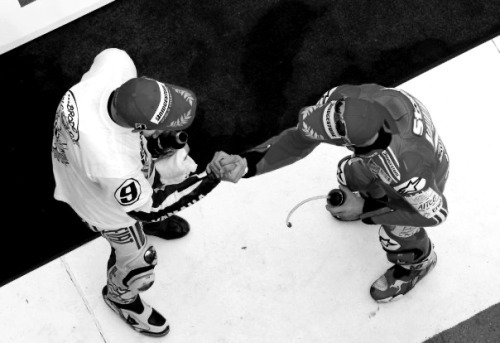
so then. valentino is projected upon, while casey gets the role of the one loathed by the public. written off before he truly got a chance, blamed even when he is blameless. valentino is the inverse - he is uplifted, he inspires emotions in others as has always been his mission statement... that kind of love comes with its own cost, as valentino is well aware. it is also a love that easily turns ugly when directed at valentino's competitors, of which valentino is again aware. to him, this too is part of the natural landscape of sports... nothing unfamiliar to anyone raised within football culture. both of them are aware of the public's fickle nature; both are prepared to treat the crowd as more of a mob. a lot of rgu concerns societal roles, how baked in they are within every facet of society, how immutable they can feel... valentino and casey are both given their parts to play early enough that almost nothing was ever going to be enough to alter those roles during the course of their careers. each perception of them inevitably has been subjected to this filter - the beloved clown prince versus the moaner. in this, as in quite a few other things, valentino and casey neatly find themselves in opposition. even if, of course, casey ended up having to learn something from valentino in the art of entertainment. casey's role in that particular rivalry is as much as anything else that of the reluctant student - both on and off the track. and casey in all his talent is perhaps valentino's very best student... in valentino, he sees the shadow that he must gradually incorporate into himself - the basest of ideals he must both reject and draw from to survive and mature. a coming-of-age story where casey is forced to transform whether he wants to or not
I've been avoiding just regurgitating stuff I've written in the past, but I do think this paragraph from here is pretty relevant:
and valentino isn’t just a foil in the sense that he provides a striking contrast for casey to define himself against - he is also the agent of transformation who forces casey to learn from him, to grow and change himself, as well as a mirror who can throw into sharp relief elements of casey that might have otherwise gone unnoticed. not to get too jungian here, but the analytical psychologists would say that casey is being forced to confront his shadow self, with valentino quite nicely mapping onto a trickster archetype (junk science but can be fun if you don’t take it too seriously). the unconscious elements of casey’s personality he is not entirely at ease with, these strict codes and rules and standards he subjects both himself and the rest of the world to… valentino both acts as an embodiment of the various injustices casey has experienced throughout his life, a living breathing representation of many of the grievances casey has accumulated - and as this discomforting presence that teaches casey things about human nature, including those parts of himself that had existed within casey’s emotional 'blind spot’. valentino exists in such violent opposition to a lot of casey’s most strongly felt ideals that he not only serves as a conveniently malevolent presence to be projected upon at will, but also as this mechanism by which casey is forced to confront the shadow. it’s all over his descriptions of laguna - “valentino showed who he really was”, “I learned a lot about character, I learned a lot about race craft, I learned a lot about what people were capable of”, “I underestimated what people are capable of just to win a race”… valentino deceives, he manipulates, he tricks - but he also serves the function of revealing what was hidden. and on the one hand, it makes casey recommit to his own values, knowing that he would not have acted like valentino did - “in his place I would have apologised”, “I couldn’t have done that overtaking, if I touched someone and moved them I felt guilty. it was the stupid part of my character, but it was what kept me asleep at night”. but on the other hand, it also prompts a transformation within casey - a “change in mindset”, something that “helped me in the following years”, adopt “a different mentality”, that taught him to “be more selfish with my racing”, to “race for myself”. again: “but, after two years of racing with people who don’t worry about you, I’ve learned that I have to do the same.” “people think it was the turning point of the season, but instead it was the turning point of my career, because from that moment I told myself I wouldn’t worry about thinking about others anymore” - he’s very explicit about this, isn’t he? and of course, most memorably: “what happened between me and valentino at laguna 2008 won’t happen again, or if it does, he’ll get it back tenfold”. for all that acting like valentino did would cause casey sleepless nights, if given a do-over then casey believes he would match and surpass valentino’s brutality. if that’s not being brought in touch with your own shadow I don’t know what is
valentino is everything casey would never want to be and never could have been... and yet by the end of the journey, casey has become a little more like him. valentino is both casey's imagined ideal and his imagined monster. neither of them are entirely true or untrue - but both exist in casey's mind as much to fulfil a certain function for him as they are as an 'objective' truth
and even in the unadulterated adoration valentino receives you will find an element of dehumanisation... valentino captures the emotion of the common person, but he himself becomes a little less human in the process. an idol, a god, a monster... his rivals increasingly were drawn from the pool of his own fans, who brought along with them their own conceptions of valentino before they ever even knew him. jorge studied him endlessly, dissected him with his instructor in the dark art of communication, wrote about him in his columns. there must be something strange about competing against those who have analysed your smile, though valentino by then will have gotten used to that level of inescapable scrutiny. then again, of all valentino's rivals, you could say jorge had the most accurate understanding of what he was signing up for... a happy coincidence, perhaps - some of the things jorge wanted out of the rivalry, valentino was more than willing to give. jorge and the others, they saw what they wanted or needed to in valentino... and valentino has enough faces that they could find something to base that perception on. he had the ability to be all of their foils and play that role brilliantly
it is at this point of the post - safe in the knowledge that not one soul is reading what essentially by now amounts to a private journal which happens to theoretically be available online - that it is time to jump off the deep end. let's talk witchcraft
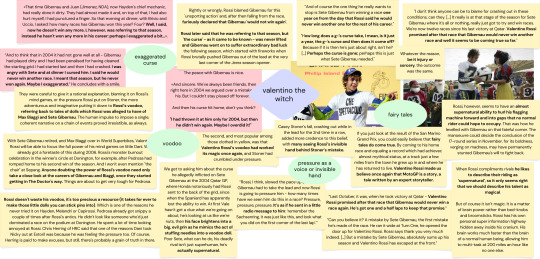
I recently made a post where I laid out my personal general explanation for how valentino keeps creating these like... narrative nexus events, ridiculously dramatic and memorable races that somehow just manage to completely change the vibe of an entire season, rivalry, etc. that was all very much about what valentino was doing in practise. there's real sporting reasons for why his approach to competition also has this particularly pronounced mental effect on rivals. obviously, that stuff is not really in the spirit of this post - I do quite like the stuff I wrote in terms of elaborating how 'valentino the storyteller' functions, but this time round I really am just talking about vibes
the thing about anthy in rgu is that... okay, I know the whole series is a deconstruction of fairy tales, that it's critically engaging with these assigned roles including that of 'witch', that anthy is constantly suffering throughout the story, that she is a victim of this storybook structure. but I can't help it, I do actually love anthy's version of being a witch. I love when she gets to be mean and torments the student council members, I love what she does with mikage, I love the mystique and the shape her 'powers' take and so on. it's a very compelling portrayal of witchcraft in its own right. a lot of anthy's actual witchcraft is focused around appearances, around illusion, around trickery and deceit and manipulation of the mind. her magic in some way 'protects' dios, yes, she saves him from the brink of death - and she does seem to have some more 'offence-based' ability in providing the sword to whoever possesses the rose bride. but even the sword seems to have little actual power in and of itself - saionji outright says that the power of the sword depends on the wielder. utena has to channel dios herself... which at most is only very loosely connected to anthy. she is the sword's host. beyond that, she dabbles in types of transformation... shapeshifting used to turn nanami into a cow, illusion and memory manipulation to make mikage see her as mamiya, transfiguring her own clothes and embellishing the uniform of the current owner of the rose bride in preparation for the duel. additionally, she seems to have some natural affinity for animals, with chu-chu essentially functioning as the witch's familiar. beyond that are the more subtle ways in which anthy works in conjunction with the setting to warp reality. the strangeness of the school and how she plays into its absurdist logic, the way she seems destined to attract hatred upon herself, how she seems to subtly affect and manipulate those around her... she serves as a mirror for the other characters to see certain elements of themselves reflected back, the blank slate to be projected on... her ability to draw out these traits is not clearly supernatural, but is not not that either
the school itself does a lot of work in slowly breaking down its inhabitants, subjecting them to its absurdist logic and making utena ever more accepting of the bizarre events that surround her. the pitch is one of surreal melodrama - so utena may wonder and scoff at the duels and the mirage castle in episode one, but by episode six she does not even blink at a kangaroo with boxing gloves interrupting her conversation. the school destabilises its inhabitants and removes the foundations of their very understanding of reality. knowing what we do of anthy and akio's influence on proceedings within the school, it feels reasonable to treat it as an artificial environment of sorts... the destabilising elements are not a bug, they are a feature. and, well, in the artificiality of the drama it presents, it does bear some superficial similarity with sports - which is all about artificial stakes. nothing about sports is real... the stakes, certainly for the viewer, are essentially disconnected from their material conditions. there is no rational reason to care about sports. motogp takes this one step further by making the trappings of the sport so patently ridiculous, embracing surreal melodrama all the way. a lot of the sport is absurd, from the body horror elements in how it handles injuries to the complicated network of allegiances and animosities that exists between its most high profile participants to its celebrations. while often scoffed at from the outside, or indeed by podcast hosts, motogp's over-the-top silly staged celebrations are part of the sport now, indelibly so. a frequently cited reason for why these celebrations are so unpalatable is in their very artificiality, the theatricality supposedly sapping away the 'true' emotions of the moment - they are accused of inauthenticity. but the inauthenticity... is the point. this is a show. it is theatre. it is entertainment. none of it is 'real'. you can resent your attention being drawn to the props or you can embrace the absurdity. you were always watching a stage
and of course, this is in large part valentino's doing. his fingerprints are all over the sport, but this remains one of his most noticeable impacts... having a bit of a laff as a teenager in the nineties, and now all these years later we've got terminator reenactments that baffle any outsider to the sport. a lot of the traditions of any sport will organically develop over time - but to those baffled outsiders, you would have to explain that this can all essentially be traced back the influence of a single person. valentino was all show, all theatre, all the time. his gift was in making the emotions so earnest that the artificiality got lost in the mix... again, without the emotions, none of this works. valentino's witchcraft is aesthetic as much as anything else - an affinity for illusions and mirages that allowed him to repeatedly take control of the situation. look at how he used his celebrations... in quite straightforwardly practical terms, they were very much part of his arsenal, a manner in which he could psychologically bludgeon the opposition. a way to make the defeat sting more for the opponent, a way of defusing his own past errors, a way of ensuring he alone had possession of the limelight. defeating his opponents by strangling them of oxygen. he has made this level of theatricality more or less the norm within the sport, a mode of engagement that suits him better than anyone else. and look at what he did to his rivals... he drew them into his web, forced them to join him in a world where cursing one of his rivals became an accepted, established sporting narrative. be wary of taking on valentino - he can break his opponents. he will put you under pressure until you crack. and everyone watching is waiting for that moment... if you slip, even just for a moment, everyone might just decide to believe he has worked his black magic on you
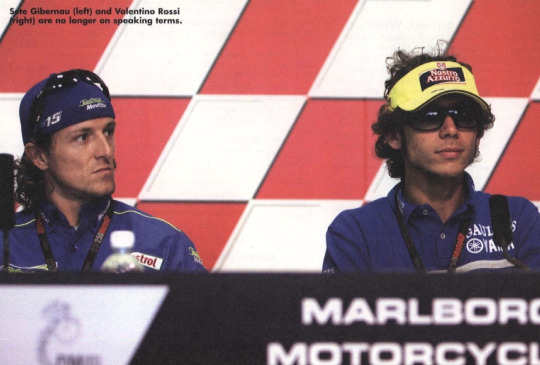
when valentino places his curse on sete, what he is essentially doing is putting him back in his place. sete had been his friend before he was his rival, someone who had trained with him and advised him how to transition to the premier class and had spent holidays with him. and then he became the challenger valentino never should have had. not the ultra-talented wunderkind who set the sport alight with their irrefutable natural skill - no, instead valentino faced an unexpected contender... one who had suddenly emerged on the scene when already a little older and a little wiser. the message valentino received from the press was crystal clear on this front - valentino should not be losing to this man. sete should have been beneath valentino. every defeat was a humiliation, one that called into question valentino's own grit and resolve. why is it that so much of the discourse in that early 2003 season was so concerned with why valentino was faltering, rather than paying credit to the man who was actually beating him? sete was at best a feel-good story... but feel-good stories do not make for worthy challengers. if valentino's later rivalries reflected well on him by allowing him to take on and best the new great hopes of the sport, this rivalry felt for a while like it could only do harm to valentino. sete had risen above his station... affluent and well-connected outside of the sport, born to a prominent family and afforded a good education - within the artificial confines of motorcycling competition he was far beneath valentino in the pecking order. he had become better than he was supposed to have been, he had defied those who had already written the narrative of his career, and he had imposed himself where he had no right to be
is it any surprise, then, that these defeats particularly grated for valentino? why is it that he looks quite so miserable at sachsenring 2003, in a way he does not after any of his other premier class defeats? it was sete specifically he could not stand losing to - in part because he had been told he shouldn't. even pre-qatar 2004, valentino is preemptively gloating at the chance to separate himself once again from sete. "a return to reality that is difficult to accept" he says of sete's dwindling title hopes during the motegi weekend... sete had had the audacity to seriously believe he might be a title contender, and for that valentino is going to punish him. after the events of qatar, all bets are off. while his comment that he was looking for an "excuse" not to talk to sete were made in anger and should perhaps not be taken completely literally, while he does most likely have a genuine grievance when it comes to the events of qatar... once valentino is given his excuse, he can fully devote himself to the task of destroying sete. what he is doing, in essence, is reimposing the status quo of the sport. here stand the talented - over there are their lesser peers... sete had already been assigned a role to play, had rejected the narrative he had been told was his own - but now, the narrative comes crashing back in with a vengeance. the story punishes him brutally for ever believing that he was something he was not. and in the worst indignity of them all, it has since sought to erase him from the tale entirely. valentino's authorial hand once again makes itself known - he, more than anyone else, is enforcing this erasure - but obviously it is worth questioning why everyone else has been so willing to go along with this. they were there, they saw all of this unfold, they at least should know valentino was in genuine jeopardy... the most myopic, miserly, miserable conclusion to draw is that valentino was never truly competitively threatened, that with full benefit of hindsight he was simply never going to lose to one who occupied such an inferior position in the hierarchy that sports logic follows. as depressing as this would be, perhaps it is the correct conclusion to draw. who knows
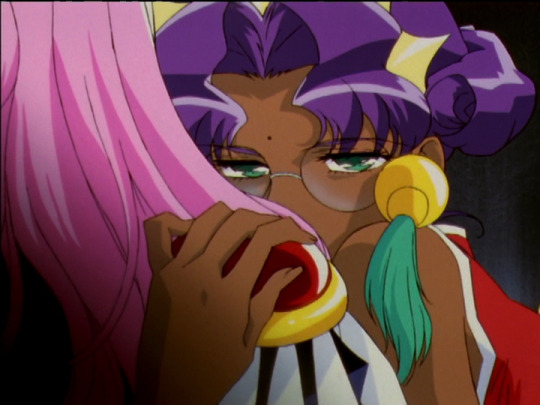
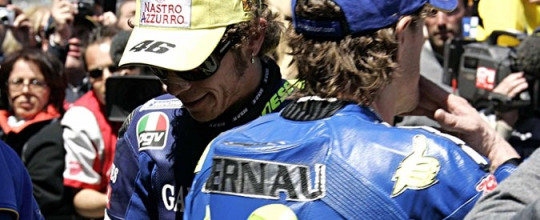
either way, valentino gets his will. jerez 2005 is when he strikes his fatal blow - and it is the moment he completes the punishment of his friend. again, this is reimposing the status quo... it serves as a cruel reminder to sete that he has nothing but defeat coming his way, that he is nothing. the last corner lunge in all its desperation serves to remind sete that valentino will stop at nothing to beat him. valentino would rather crash them both out than see sete win another race. and having the full weight of valentino's ire directed at you tends not to be a pleasant experience. from mid-2003 to 2005, valentino continually reconstituted the reality of the sport... rewriting the rules as he saw fit, deserting the dominant manufacturer on a whim and winning with his new project. deserting his friendship with sete on a whim and changing that story too. but for all these superficial adjustments, there were some laws of sport he was never going to touch. he enforces some of its cruellest edicts in his revenge against sete, destroying sete because he can and retroactively ensuring that sete's existing achievements would not get the respect they deserve. even in his own mind, perhaps most importantly there, valentino has been able to dismiss sete. this is his vengeance... pressure, pressure, pressure, exerted ever more expertly and more viciously off the track and on it to terminally crack sete's confidence. sports is all in the head and valentino ensured that sete would be trapped in his own. at its worst, competing can be a living nightmare. valentino did his best to become monster to the man who had once been his friend
here is the fun in having a witch around, then - this character who subtly exerts control on those around them to torment them. a voice in your head while you are riding, reminding you of the last time you made a mistake. the invisible hand that forces your errors. gags about your rival making dolls of you, carried around to stick pins into. the pernicious ill luck you face, so inescapable that surely it cannot just be coincidence... a malicious influence hanging around the edges of perception, doing the bidding of a witch. and what valentino does to sete benefits him beyond the end of that rivalry by providing him with a reputation of someone who does not just beat opponents, but breaks them. it is a reputation that did much of the legwork for him in his rivalry against casey, generally minimising how much work he had to do himself. little use in going around all day talking about how you might have broken another rival if somebody else is willing to do that for you, right. given casey's own specific neuroses, obviously this just happened to be basically the worst possible torment anyone could have cooked up for him - which was just happy coincidence, albeit of the sort valentino saw an awful lot of over the course of his career. the post-laguna stretch was so horrendous for casey precisely because it appeared to prove everyone's suspicions... which of course to some extent can become a self-fulfilling prophecy. everyone thinking you are broken is more likely to break you. a common trick in the charlatan's repertoire - let the mark prove the magic for you
so there we have the confines of valentino's witchcraft. a certain stylistic sensibility... flash and glamour, the sport's aesthetic ever more loud and colourful. positioning himself as the showman as well as the authorial hand, capable of writing his own fairy tale. an ability to reinvent himself, new eras demarcated with shifts in his own appearance as well as approach. a keen and savvy operator when dealing with the media, happy to slip them a line and waiting for it to bite his opponents. a weaponisation of his persona as the showman, most obviously in his celebrations. a reputation that does much of his work for him. a public that treats him like an idol and a god - surrounded by people who wilfully project onto him. he transforms and he manipulates and he deceives; he tricks his rivals into conversing with a mirage, then punishes them for their folly. slippery and hard to pin down and many things to many people... the sport is always watching you, so you had better watch it back
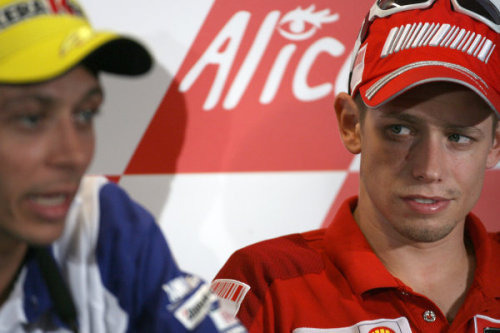
the only rival who ever truly proved capable of beating valentino at his own game was casey - as ever, the best student of the lot. while casey's evolution into a savvy media operator in his own right is interesting, as is valentino's complete and utter disinterest in countering the narrative casey repeatedly has set out in the press, there is a far more obvious moment in which casey's willingness to twist valentino's tools against their maker pays off. it is the moment casey continues to refer back to as often as he can - jerez 2011, when he immortalised a racing incident forevermore with his pithy retort to valentino's apology. casey understands the power of that line and that moment as well as anyone, which is of course why he will never stop talking about it... in some ways, the scene echoes laguna 2008, their other most infamous confrontation. first off, the line itself - "ambition outweighed your talent" quite obviously resembles "let his ambition to win take control over his technique", something casey accused valentino of in the aftermath of laguna. this distinction between ambition and talent, will and skill, mentality and ability... it is a continual theme in the rivalry, reflected both in what they themselves say and what others have written about it. casey calls valentino smart, valentino calls casey talented. they both question whether the other might not be a little lacking in the other dimension. the other key similarity is in how valentino has deliberately ensured casey's comments will be recorded - at laguna 2008, he interrupts casey's tv interview so that camera and microphone will capture him refuse valentino's handshake; at jerez 2011, he is accompanied by cameras to give casey his apology. back then, casey had been operating from a position of weakness, incapable of controlling his temper and biding his time. in the short term, jerez 2011 earns him a fair amount of backlash - but it does not matter. casey has waited for years to get his revenge and valentino's move to ducati would deny him the chance to do so on-track, which casey may secretly have regretted... this would have to be the next best thing. casey perfectly understood the importance of that image and managed to inflict a rare defeat on valentino in his own arena. integrating the shadow within himself, right... he did it on the track, and off it. if valentino is a god within the sport, then casey surely has his own place within the pantheon (x)
he is riding like a devil and is always at the front // he is very, very strong, very young - a great talent who rides without many problems. he is riding like a god! // today he rode like a god and he's a fantastic rival // he rode like a devil so he deserved the championship and he's number one // he rode like a devil and he made great results last year with nothing to lose and he raced all or nothing
valentino is the god of motogp, at times explicitly referred to as such, and casey is the heretic who dares to challenge him and even dares to win. who is resented by many for his accomplishments, all while failing to be quite what the motogp world wants him to be. casey is denying valentino [...] isn’t it just FUN when we’re talking rivalries and narrative foils and all the rest of it to have valentino come along, this bloke who is seen as a god by much of the world of motogp - to have him essentially anoint casey to the pantheon himself in the way he describes casey. 'rarely guilty of making an understatement’ is fair, perhaps, but valentino doesn’t generally talk about his rivals like this. it’s a casey thing! that’s why they’re such great rivals and foils, right - casey’s talent versus valentino’s ambition, this lovely dramatic contrast between two blokes who are so strikingly similar on some dimensions and violently different on others. truly two of the best to ever do it
valentino's last trick is ensuring that he is so difficult to defeat - not just as a rider, but in the totality of his persona - that any attempt to do so will inevitably burn his enemy. none of his major rivals have emerged entirely unscathed from the experience of competing against him. some are quite possibly scarred for life. valentino is the master of the pyrrhic victory... it is possible to beat him, to burn the witch and perhaps even surpass him, but valentino ensures there will always be a bittersweet quality. corrosive like the sun
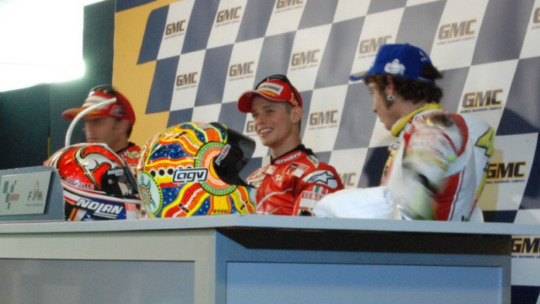
once he has exhausted all his tricks and burned all his bridges, there is no going back for anyone. all this self-mythologisation and mythologisation by others can just about manage to promote him to true mythical status within this artificial world, a world partly of his own design... and as long as this world constitutes the whole world of his rivals too, they can never entirely escape him. casey, with his complex relationship with the entire sport, all his well-documented complaints and grudges and bitterness, is of course the easiest example of this. he sees valentino in so much, the sport is linked so closely to valentino in his mind - and thus valentino is ensured further immortality as casey's shadow. which is something valentino has done with all his rivals... all of their legacies, tied inextricably with his own. a sport you dedicated your life to that still at times feels synonymous with a man you despise
which feels like a good place to wrap this up. as much fun as valentino-the-person can be to engage with, sometimes valentino-the-plot-device is just as much fun, if not more so. the narrative role of the witch is to trick and manipulate reality on the one hand - but on the other it is to reveal what is hidden. to tease out truths and buried emotions from all those around them. valentino perfectly fulfils the role of the entertainer within his sport, ramping up the inauthenticity and artificiality to allow for a true emotional excess - while also being a changeable enough slippery enough character to allow him to fulfil so many different functions over the years. upstart, challenger, king, comeback kid, underdog, fading titan, mentor... he can be any of these and all of these and none of these. his popularity is so enduring and non-questionable that it allows him liberty in some regards, the freedom to transgress in some arenas... the gaze of all the eyes of the world on him might serve to rob him of his personhood, just a little, but obviously it also represents a gift and a strength. there's something just conceptually fun about having a figure capable of bringing out the worst of those around them, revealing their flaws as surely as he does his own, acting as a nailed-on source of narrative tension. one who is dehumanised by the many eyes directed upon him at all times, but twists this in his own favour... one who uses trickery and cons and curses to enact his vengeance. it's quite the feat to be loved as a witch, you do have to say
***
obviously this whole thing was quite a... long and perhaps not particularly coherent examination of just some stuff that's been rattling in my head. as much as sports is fun to discuss as sports, sometimes it's also fun to go full-in on the narrative elements! anyway. I doubt anyone will get this far and this kind of thing generally doesn't leave my notes/brain but. I had fun with it :)
#utena anon come backkkkk to me :( my inbox and indeed my messages are extremely open#//#brr brr#//st#//clt#//curst#//ht#//wt#//et
17 notes
·
View notes